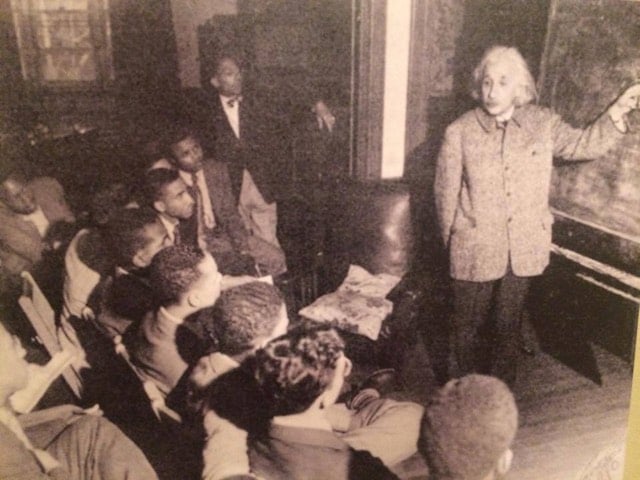Albert Einstein, civil rights advocate

In 1946, Albert Einstein, who had come to the US in 1933 and stayed to become a citizen due to Adolf Hitler’s rise to power in Germany, wrote a magazine article titled The Negro Question. In it, he called the prejudice against black Americans a “deeply entrenched evil”.
What soon makes the new arrival devoted to this country is the democratic trait among the people. I am not thinking here so much of the democratic political constitution of this country, however highly it must be praised. I am thinking of the relationship between individual people and of the attitude they maintain toward one another.
In the United States everyone feels assured of his worth as an individual. No one humbles himself before another person or class. Even the great difference in wealth, the superior power of a few, cannot undermine this healthy self-confidence and natural respect for the dignity of one’s fellow-man.
There is, however, a somber point in the social outlook of Americans. Their sense of equality and human dignity is mainly limited to men of white skins. Even among these there are prejudices of which I as a Jew am clearly conscious; but they are unimportant in comparison with the attitude of the “Whites” toward their fellow-citizens of darker complexion, particularly toward Negroes. The more I feel an American, the more this situation pains me. I can escape the feeling of complicity in it only by speaking out.
Recognizing the parallels between the treatment of Jews in Germany in the 1930s with blacks in the US, Einstein put his efforts and his money where his mouth was. He was a member of the NAACP. In 1946, the same year that letter was published, he received an honorary degree from Pennsylvania’s Lincoln University, the historically black school that was the alma mater of Langston Hughes and Thurgood Marshall. In a speech at the school that was not covered by a mainstream American press that otherwise couldn’t get enough of him, Einstein called racism “a disease of white people”:
My trip to this institution was in behalf of a worthwhile cause. There is a separation of colored people from white people in the United States. That separation is not a disease of colored people. It is a disease of white people. I do not intend to be quiet about it.
When singer Marian Anderson was denied a hotel room in Princeton for being black, Einstein hosted the singer at his home for this and several subsequent trips. He also came to the aid of W.E.B. Du Bois in his case against the US government:
Einstein continued to support progressive causes through the 1950s, when the pressure of anti-Communist witch hunts made it dangerous to do so. Another example of Einstein using his prestige to help a prominent African American occurred in 1951, when the 83-year-old W.E.B. Du Bois, a founder of the NAACP, was indicted by the federal government for failing to register as a “foreign agent” as a consequence of circulating the pro-Soviet Stockholm Peace Petition. Einstein offered to appear as a character witness for Du Bois, which convinced the judge to drop the case.
These and his other activities in this arena are documented in a 2006 book called Einstein on Race and Racism by Fred Jerome and Rodger Taylor.





Stay Connected